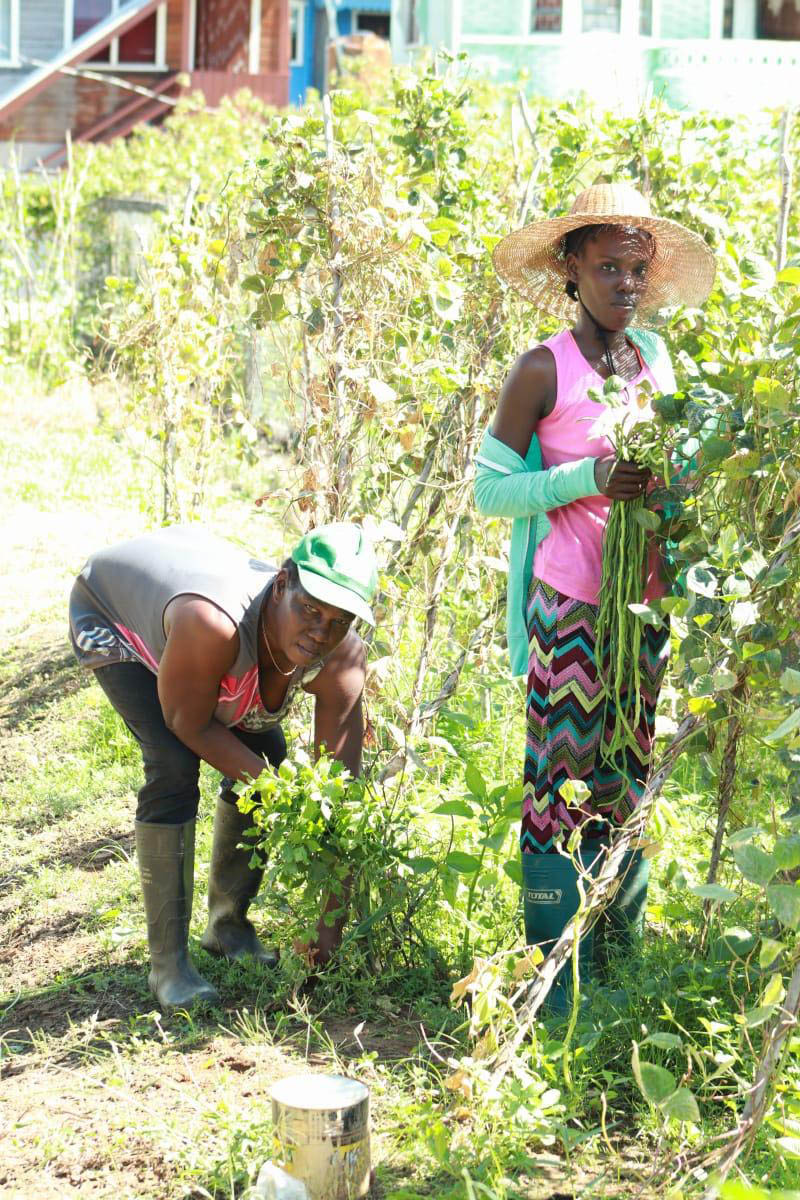At 25, Minerva Collins already has five hands-on years of farming under her belt. It is not as if she ‘cut her teeth’ on living off the land. A native of the village of Nurney, she had attended the Central Corentyne Secondary School, undergone a routine academic ‘journey’ and afterwards secured employment at a local garment factory. That, she figured, was one of the routine options open to young women.
Nor was there, as far as we could tell, any sudden burst of inspiration that caused her to ‘see the light’. What hovered constantly, however, was the spectre of her father, Conrad, who had long ago decided that a 10-acre plot of land aback of Nurney would be the source of his own income. So that for Minerva, the option of farming was within her ‘hand reach’ so to speak… and she took it.
Conrad Collins himself had been making a living from the land from much earlier, though he concedes that it was only over the past five years that he has settled seriously into the pursuit. He has pursued cattle and cash crops and is beginning to recognise uplifting windows of opportunity in ‘the land’.
Minerva runs her own show… a thriving garden on a plot of land adjacent to the family home. Rural women, unlike many of their urban counterparts, have few if any hang-ups about farming. For them the land is a living, and from Minerva’s perspective, a worthwhile one. She had spent a period of time after she had parted company with her garment factory job looking for alternative salaried employment. At some point in time she appears to have decided that she would ‘look to the land’.
Even without having taken to farming like the proverbial ‘duck to water’, Minerva concedes that the yield from her efforts has afforded her a sense of accomplishment which she would trade for nothing else. Part of her pride reposes in her absence of gender ‘hang-ups’ associated with farming being, predominantly, a man’s world. For her, it has been a question of breaking a barrier, daring to go where many of her gender have not gone. Much of the credit for this, she attributes to the support of her father.
Her choice of crops include onion, beet, bora, celery, tomato, eschallot, carila, callaloo, sweet pepper, and flavoured pepper, all in-demand cash crops and ‘good sellers’. In pursuit of the marketing aspect of her business she has created a partnership with her mother, Beverley, who travels to the Port Mourant Market, two sometimes three times weekly, to sell the produce. At the market, Beverley must match her own sense of diligence and ‘hustle’ against other equally proficient vendors if her partnership with her daughter is to prosper.
These past four months, the presence of COVID-19 has been a game-changer. Earnings from the farming enterprise have, Minerva says, reduced by at least 50%… it could be more. On the toughest days at the Port Mourant Market, Beverley must ‘dig deep’, immersing herself in intense price-jousting as the entire market becomes enveloped in the intense pursuit of deal-making with buyers. At the end of the day, takings may ‘take a hit.’ Anything, however, is better than the agony of spoilage and waste.
Beyond her home turf, Minerva has made previous trips to the city to attend the Guyana Marketing Corporation’s Farmers’ Market. Those trips, she says, had been worth the while. Beet and onions are usually her ‘big sellers’ at the Farmers’ Market. This year, however, the intervention of the coronavirus means that farmers travelling from long distances must now hedge their bets.
Minerva’s involvement with the cultivation of onions and beet derived from her encounter with the Canadian – funded Promotion of Regional Opportunities for Produce through Enterprise and Linkages (PROPEL) through the National Agricultural Research and Extension Institute (NAREI). The project, she says, arose out of an initiative by the two entities to determine whether some of the country’s traditionally imported crops could be cultivated locally. Following a few failures, Minerva, up to this time, has reaped four crops of the onions. Beet, too, has brought her some measure of satisfaction. At last December’s Farmers’ Market, she sold twelve pounds of beet.
Now completely immersed in her farming pursuits, Minerva has, over time, ‘trained’ herself to meet the demands of the routine. Her day begins at 5am when she must ‘chip in’ with the preparation of the family breakfast. Afterwards she makes a proprietorial visit to her garden to ‘look things over’ and to engage in such pursuits as may require her attention… reaping, weeding, watering and attending to what may be plant disease-related matters. “There is always something to do in the garden,” she says. By 10:00 she is on her bike and pedalling her way around Nurney and through the villages of Limlair, Friendship, and Kildonan, selling milk. By 3pm Minerva is back in her garden where she remains, engaged in one activity or another until around 6:00pm.
There are, as yet, no deliberately laid-out “plans for the future.” The current focus is on consolidation and growth. At the moment she is savouring the sense of accomplishment that she continues to derive from what she has done so far. If she is not indifferent to the changes that have been brought about by the advent of COVID-19, the expression on her face sends an unmistakable message that she will make a mark, the ravages of coronavirus notwithstanding.
Persons interested in acquiring farm produce from Minerva can contact her at …………… to probe the possibilities and, where possible, work out the details.
Menorva cultivates a range of cash crops and is prepared to engage persons (including) vendors regarding arrangements for purchases, subject to availability. She can be reached at telephone numbers 6886620 or 6972894









